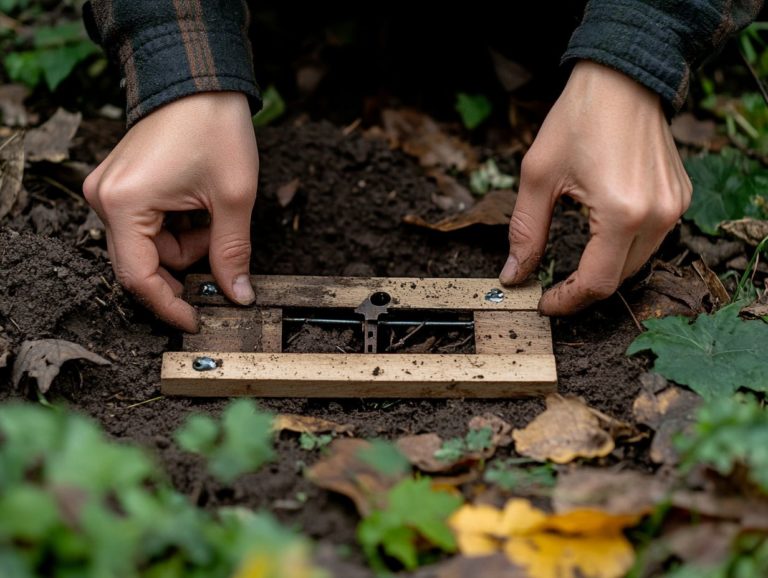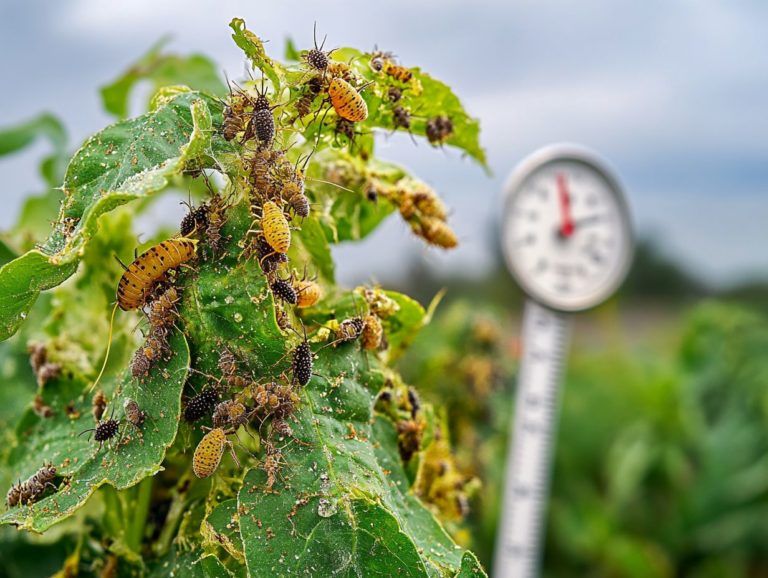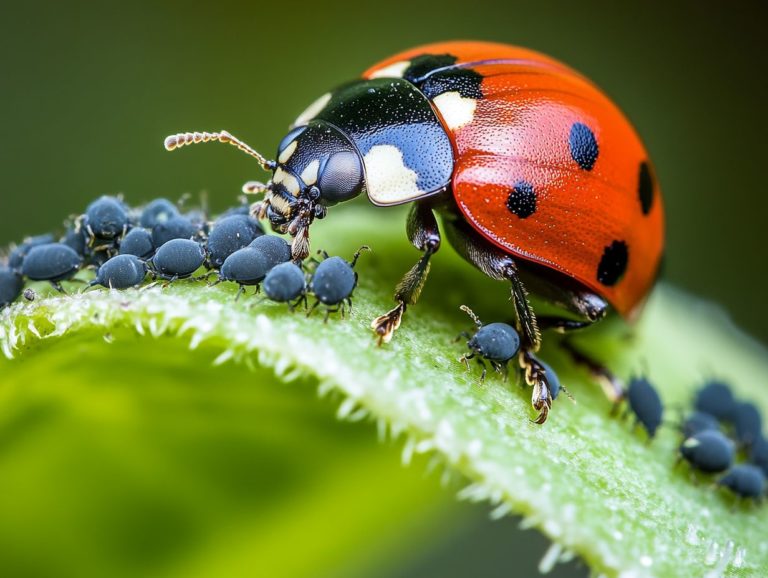Top 5 Natural Pest Deterrents for Your Garden
Gardening can truly be a rewarding endeavor. Yet the threat of pests often looms over your hard work.
Thankfully, embracing natural pest deterrents can shield your plants while nurturing a healthier ecosystem.
This article delves into five effective strategies, including companion planting, essential oils, beneficial insects, and homemade repellents.
You’ll also discover practical tips for creating physical barriers and maintaining the delicate balance between pests and their natural predators.
Prepare to cultivate a thriving garden while steering clear of chemical interventions!
Contents
- Key Takeaways:
- 1. Plant Companion Plants
- 2. Use Essential Oils
- 3. Create Physical Barriers
- 4. Introduce Beneficial Insects
- 5. Make Homemade Pest Repellents
- What Are the Most Common Garden Pests and How Do They Affect Plants?
- How Can Companion Plants Help Deter Pests?
- Which Essential Oils Are Effective Against Pests?
- What Types of Physical Barriers Can Be Used in the Garden?
- What Are Some Examples of Beneficial Insects and How Do They Help with Pest Control?
- How Can One Make Homemade Pest Repellents Using Natural Ingredients?
- Are There Any Drawbacks to Using Natural Pest Deterrents?
- How Can One Maintain a Healthy Balance of Pests and Beneficial Insects in the Garden?
- What Other Natural Methods Can Be Used for Pest Control in the Garden?
- Frequently Asked Questions
- 1. What are the top 5 natural pest deterrents for your garden, and how can they support sustainable pest control?
- 2. How does neem oil help keep pests away from my garden?
- 3. Can diatomaceous earth be harmful to my plants?
- 4. How does garlic work as a natural pest deterrent?
- 5. What makes marigolds an effective pest deterrent?
- 6. How do ladybugs help control pests in my garden?
Key Takeaways:
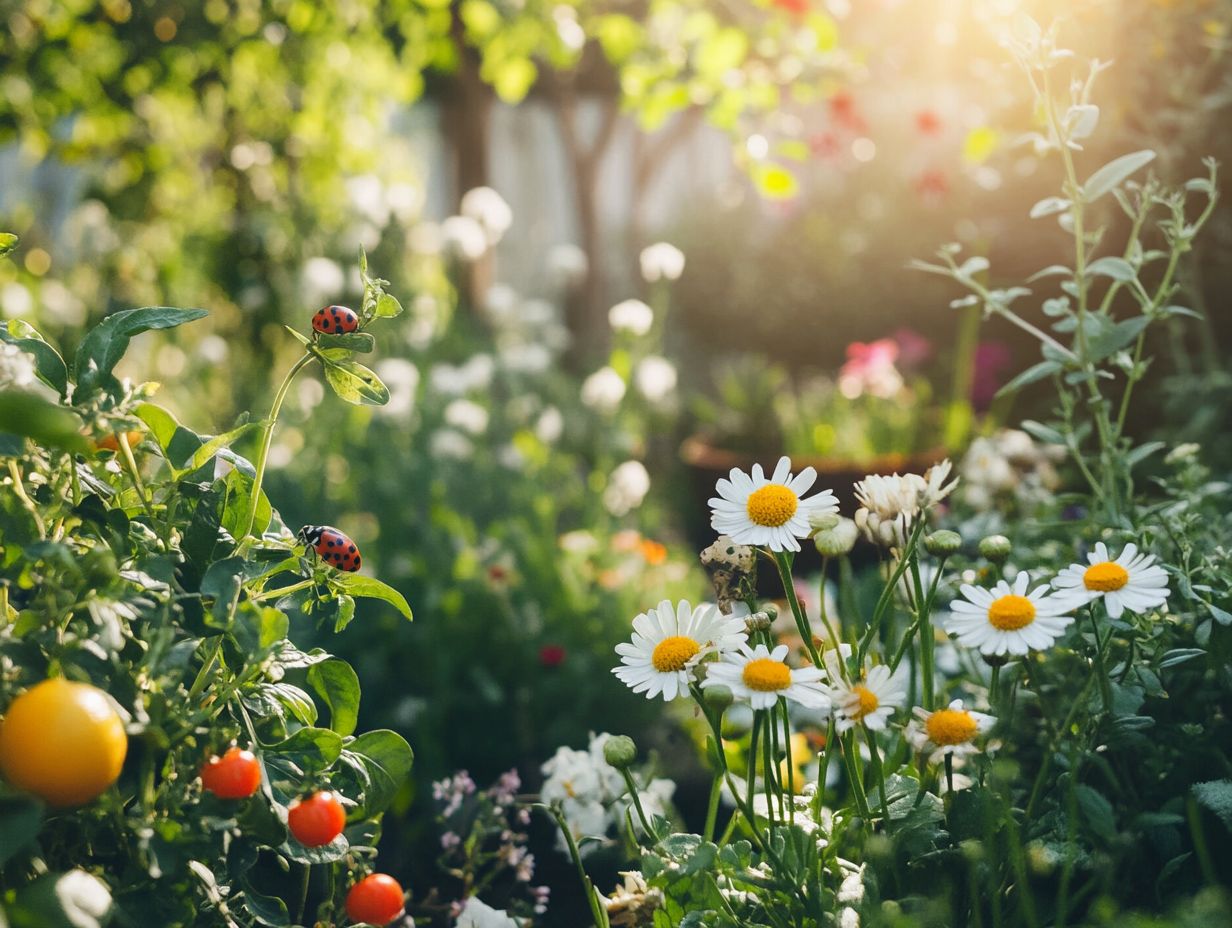
- Companion plants are your garden’s best friends they deter pests and boost health!
- Essential oils such as peppermint, garlic, and neem can easily be incorporated into your gardening routine for effective pest control.
- Physical barriers like netting or row covers provide crucial protection for your plants.
1. Plant Companion Plants
Companion planting serves as an exceptional natural pest control strategy. It harnesses the way different plants work together, creating a healthier garden ecosystem.
This practice is essential for safeguarding your garden against pests while enhancing biodiversity and minimizing pollution.
By thoughtfully pairing pest-repelling plants like marigolds with tomatoes or garlic with roses, you fend off nuisances such as aphids and rabbits, while promoting the overall vitality of your garden.
This method does much more than just keep pests away; it transforms your garden! For instance, when you combine basil with peppers, you re not only elevating flavor but also attracting beneficial insects like pollinators.
These relationships are vital in sustaining a balanced ecosystem where beneficial species can flourish. Blooming Haus champions these natural methods, encouraging you to embrace such practices for sustainable pest control through simple yet effective plant pairings.
2. Use Essential Oils
Essential oils can be a game changer in your approach to natural pest control. They provide organic solutions that protect your garden while keeping harmful insects at bay without resorting to harsh chemical methods.
Among the standout options, peppermint and lavender truly shine for their pest-repelling prowess. The strong scent of peppermint works wonders against ants and spiders, while lavender is especially effective against pesky mosquitoes and moths.
To whip up your own homemade insecticide, mix a few drops of these essential oils with water in a spray bottle. This delightful concoction fills your garden with a pleasant aroma and provides effective protection!
By using these natural remedies, you shield your plants and foster a pollinator-friendly oasis, free from harsh chemicals that could endanger beneficial creatures like bees and butterflies.
3. Create Physical Barriers
Creating physical barriers is an essential pest control strategy that safeguards your garden from unwanted pests while nurturing a sustainable gardening environment.
By incorporating different types of barriers like row covers, fences, and netting you can effectively shield your plants from insects and larger animals.
For instance, row covers provide a protective layer that not only keeps harmful bugs at bay but also helps retain warmth, promoting optimal plant growth. Fences act as a deterrent for larger pests such as deer and rabbits, while netting protects your fruits and vegetables from birds and insects alike.
These methods lessen your reliance on chemical pesticides while fostering a holistic approach to cultivating a thriving, healthy garden ecosystem.
Start today! Transform your garden into a thriving haven without chemicals your plants will thank you!
4. Introduce Beneficial Insects
Introducing beneficial insects into your garden is a crucial element of natural pest control that not only reduces pest numbers but also enhances biodiversity and ecological balance.
These little allies, such as ladybugs and lacewings, actively hunt and consume harmful pests like aphids and caterpillars. By incorporating these insects, you can significantly reduce your reliance on chemical pesticides and foster healthier ecosystems.
EcoFleet and the Woodland Trust promote the importance of caring for these natural allies. They advocate for sustainable farming practices that respect nature’s balance. By ensuring a harmonious coexistence between pests and beneficial insects, you can cultivate a thriving agricultural environment while minimizing your environmental impact. This is an essential strategy for tackling the challenges of modern farming.
5. Make Homemade Pest Repellents
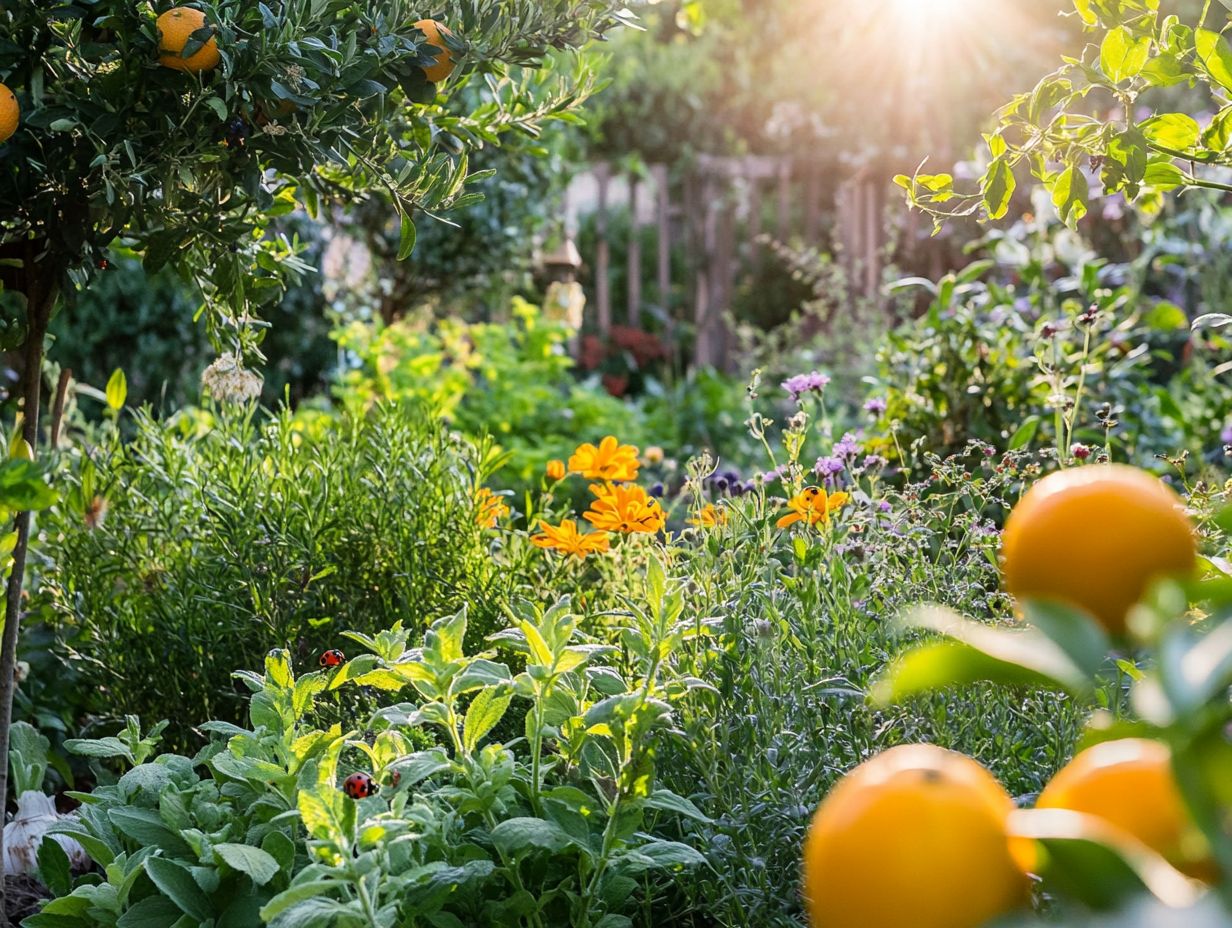
Creating homemade pest repellents is a cost-effective and eco-friendly approach to natural pest control, enabling you to safeguard your garden with simple, organic ingredients.
Utilizing everyday staples like garlic, soap, and vinegar, you can craft powerful yet gentle insecticides that deter pests without harming beneficial insects or the environment. These common household items provide a safer alternative to chemical pesticides and often outperform them by targeting specific insect behaviors.
For instance, garlic boasts strong repellent properties that can fend off aphids and beetles, while soap works wonders in suffocating soft-bodied insects. Delving into these recipes not only enriches your gardening experience but also nurtures a healthier ecosystem, transforming your garden into a sanctuary for biodiversity.
What Are the Most Common Garden Pests and How Do They Affect Plants?
The most common garden pests, like aphids and rabbits, can wreak havoc on your plants by damaging foliage, stunting growth, and compromising the overall vitality of your garden. This makes effective pest control measures essential to mitigate their impact.
Other troublesome pests, including slugs, beetles, and caterpillars, can further hinder your plants’ health, leaving behind unsightly scars and reducing yields. To tackle these nuisances while maintaining ecological balance, consider employing organic pesticides made from natural ingredients, such as neem oil and insecticidal soaps.
Implement cultural practices like crop rotation to create a resilient garden ecosystem. Attracting beneficial insects like ladybugs can also help. Integrated Pest Management (IPM) involves using a combination of methods to control pests effectively, ultimately fostering a healthier environment for your plants to thrive.
How Can Companion Plants Help Deter Pests?
Companion plants like marigolds and tomatoes work together beautifully to fend off pests naturally, demonstrating the power of companion planting as a form of effective pest control.
By placing these vibrant flowers next to your vegetables, you can cultivate a harmonious ecosystem that wards off pesky intruders like aphids and nematodes while enriching the soil with nutrients. For instance, the strong scent of marigolds can confuse and repel harmful insects, while their roots actively suppress unhealthy nematode populations lurking in the ground.
These thoughtful pairings bolster pest resistance and encourage greater pollination and growth in neighboring plants. This ultimately enhances the vitality of your entire garden, ensuring robust health for all the flora involved.
Which Essential Oils Are Effective Against Pests?
Essential oils like peppermint, eucalyptus, and tea tree have proven to be remarkably effective against various garden pests. They create a healthier gardening environment by avoiding harsh chemicals!
These natural extracts keep unwanted insects away. They also contribute to a healthier gardening environment, sparing you the harsh chemicals often found in commercial products.
Peppermint oil is particularly adept at repelling ants and spiders. Eucalyptus is your go-to for warding off mosquitoes and gnats.
Tea tree oil excels at tackling aphids and combating fungal infections.
To harness the full potential of these oils safely and effectively, it’s crucial to dilute them with a carrier oil or water. Applying them as a spray around affected areas enables targeted treatment while protecting beneficial insects that play a vital role in your garden.
What Types of Physical Barriers Can Be Used in the Garden?
Physical barriers, such as row covers, mesh nets, and fences, are effective pest control measures. They safeguard your garden from unwanted intruders while promoting sustainable gardening practices!
These barriers deter small pests like aphids and caterpillars and keep larger animals, such as rabbits and deer, at bay. Proper installation is essential.
Row covers should be securely anchored to resist wind. Fences must be tall enough to deter ambitious jumpers.
Regular maintenance is essential check for holes and signs of wear to ensure that these barriers continue to work their magic over time. By integrating various physical barriers into a comprehensive pest management plan, you can significantly enhance their effectiveness!
What Are Some Examples of Beneficial Insects and How Do They Help with Pest Control?
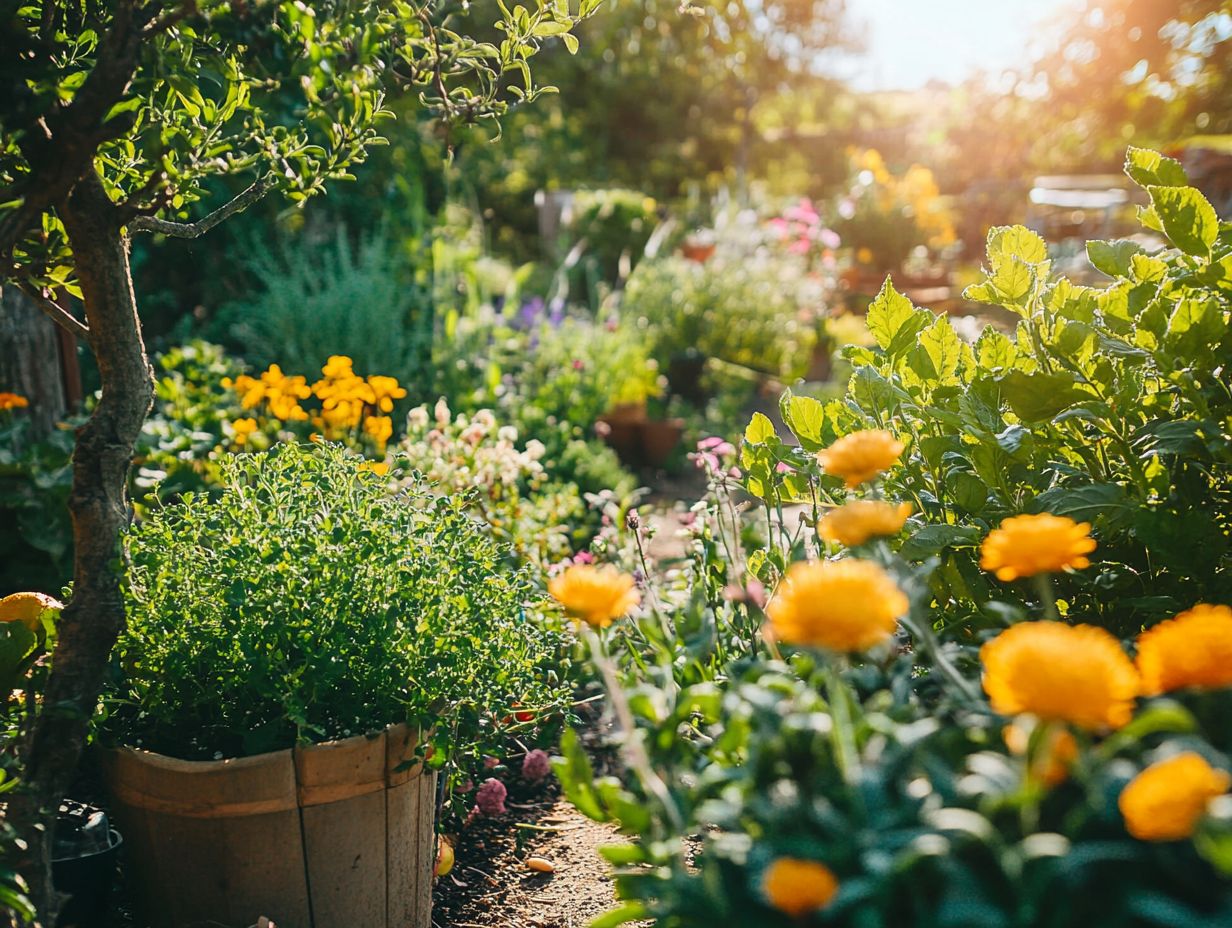
Beneficial insects, such as ladybugs, lacewings, and predatory wasps, are your allies in the quest for natural pest control. They play a crucial role by preying on harmful pests!
These tiny warriors control pest populations. This ensures troublesome species like aphids and caterpillars don’t invade your garden.
Take ladybugs, for example; they can munch their way through thousands of aphids during their lifetime. Lacewings, on the other hand, target a variety of pests throughout their life stages.
Let s not forget predatory wasps, which hunt caterpillars and lay their eggs inside them, amplifying their pest control prowess!
To draw these beneficial insects into your garden, create a welcoming environment. Think diverse flowering plants and habitats filled with nectar-rich blooms. Steer clear of harmful pesticides!
How Can One Make Homemade Pest Repellents Using Natural Ingredients?
Making homemade pest repellents with natural ingredients is easy and effective! You can protect your plants without harsh chemicals.
By tapping into the potential of common household staples like garlic, soap, and essential oils, you can whip up effective solutions. These keep pests at bay and are gentle on the environment.
The process is remarkably simple and requires minimal effort, making it an ideal endeavor for both seasoned gardeners and enthusiastic beginners alike.
These natural mixtures can be customized to specifically target pesky insects. This offers a level of personalization that commercial products often lack.
Plus, crafting these remedies at home champions sustainability and cuts down on plastic waste. This contributes to a healthier planet for everyone!
Are There Any Drawbacks to Using Natural Pest Deterrents?
While natural pest control methods present a host of benefits, there are some drawbacks worth considering, notably their potential for slower effectiveness when compared to chemical solutions.
This delay can understandably be frustrating if you’re seeking immediate results, especially in the face of severe infestations. Without diligent monitoring, natural solutions could lead to reinfestation, as certain pests have a knack for adapting and becoming resilient over time.
To address these challenges, using a mix of pest control methods is essential. By blending natural deterrents with cultural, mechanical, and biological strategies, you can craft a holistic approach that not only speeds up effectiveness but also ensures enduring solutions, significantly reducing the chances of recurring pest issues.
How Can One Maintain a Healthy Balance of Pests and Beneficial Insects in the Garden?
Maintaining a healthy balance of pests and beneficial insects in your garden is essential for effective natural pest control. This balance enhances biodiversity and fosters a thriving ecosystem.
To achieve this harmonious equilibrium, you can adopt several effective strategies. One approach is to plant a variety of crops, which can confuse and deter specific pests while simultaneously attracting a diverse array of beneficial insects. Creating habitats for these helpful allies like providing shelter through native plants or strategically placing stones can encourage their presence in your garden.
Practicing selective pest management by identifying and targeting only the most damaging pests allows you to protect beneficial populations, enabling them to flourish and contribute to a more resilient garden ecosystem.
What Other Natural Methods Can Be Used for Pest Control in the Garden?
Discover exciting natural pest control methods that will elevate your organic gardening game and embrace sustainable practices!
Utilizing techniques such as crop rotation not only disrupts pest life cycles but also enhances soil health over time. For example, mulching creates a protective layer that retains moisture and suppresses weeds, cutting down on habitats for unwelcome pests. By opting for organic pesticides made from natural ingredients, you ensure your garden remains free from harmful chemicals while effectively targeting pest populations.
When you combine these practices, you foster a balanced ecosystem that benefits both your plants and the beneficial insects, ultimately cultivating a thriving garden that reduces your reliance on synthetic solutions.
Frequently Asked Questions
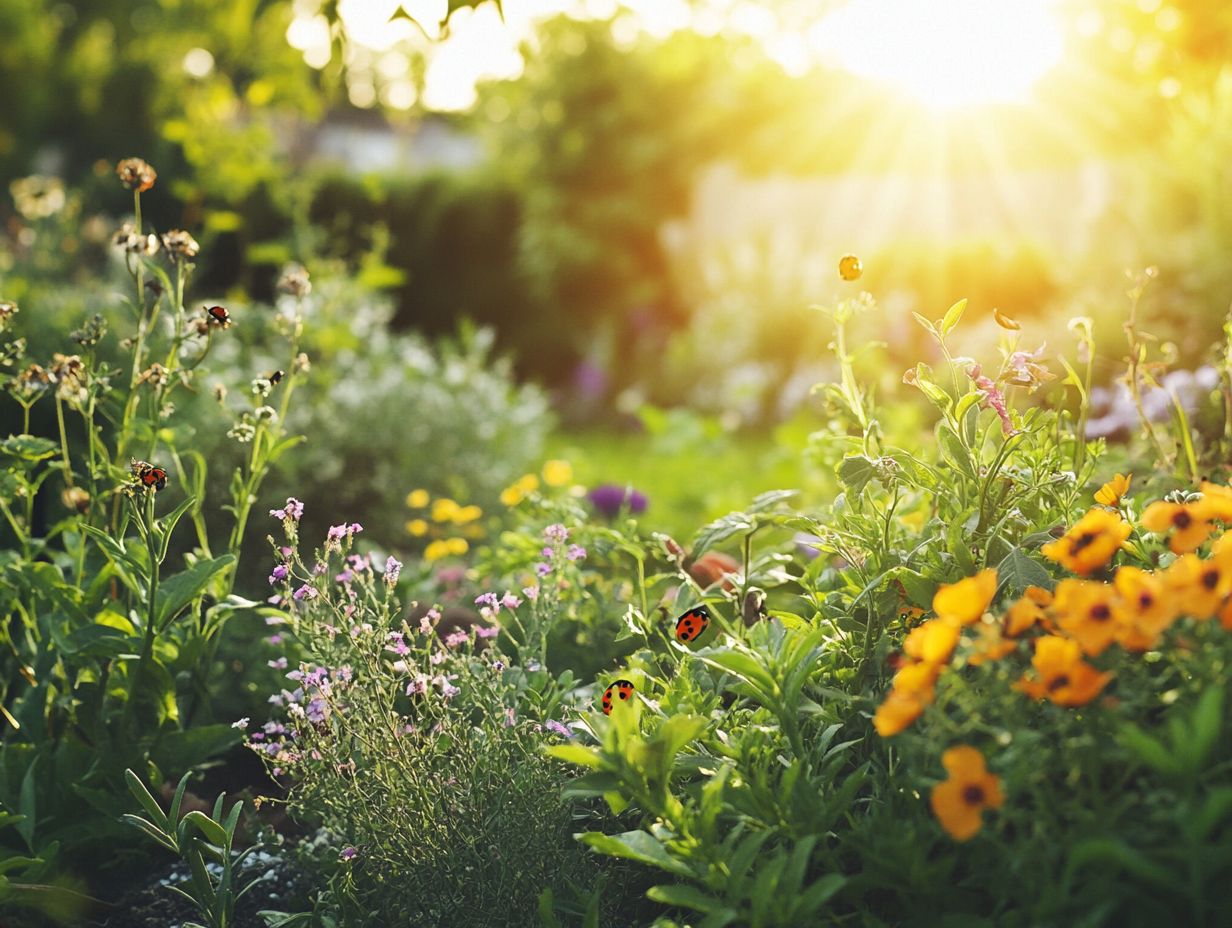
1. What are the top 5 natural pest deterrents for your garden, and how can they support sustainable pest control?
The top 5 natural pest deterrents for your garden are:
- Neem Oil
- Diatomaceous Earth
- Garlic
- Marigolds
- Ladybugs
2. How does neem oil help keep pests away from my garden?
Neem oil is derived from the neem tree and is a natural insecticide. It works by disrupting the life cycle of insects, making it difficult for them to breed and multiply. It also has a strong smell that deters many pests.
3. Can diatomaceous earth be harmful to my plants?
No, diatomaceous earth is a natural and safe pest deterrent for your garden. It is made up of tiny fossilized algae and works by dehydrating and killing insects, without harming your plants.
4. How does garlic work as a natural pest deterrent?
Garlic contains a compound called allicin, which has strong insect-repelling properties. When planted in your garden or sprayed on plants, it can help keep pests away. It also has antifungal and antibacterial properties, making it beneficial for your plants’ health.
5. What makes marigolds an effective pest deterrent?
Marigolds contain a compound called pyrethrin, which is a natural insecticide. It can repel a wide range of pests, including aphids, mosquitoes, and beetles. Their strong scent also deters pests from your garden.
6. How do ladybugs help control pests in my garden?
Ladybugs are nature’s pest control. They feed on common garden pests like aphids, mites, and scale bugs.
By attracting ladybugs to your garden, you can naturally manage pests. This method helps you avoid harmful chemicals and promotes a healthier garden!


